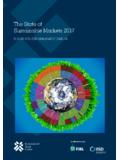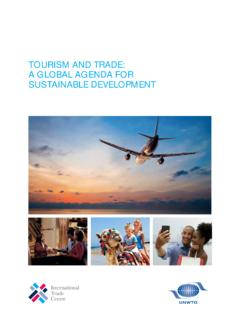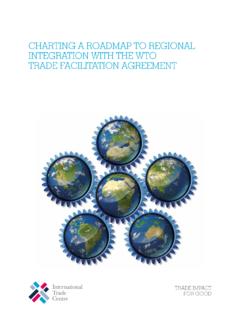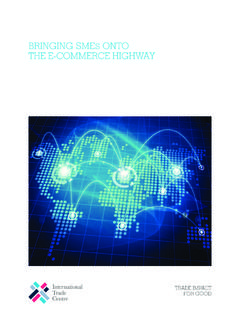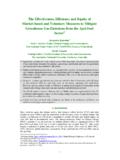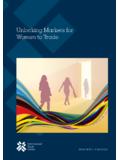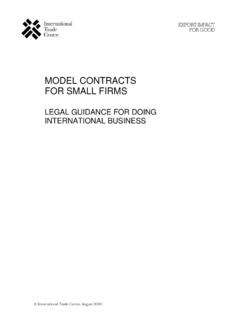Transcription of THE EUROPEAN UNION MARKET FOR SUSTAINABLE …
1 THE EUROPEAN UNION MARKET . FOR SUSTAINABLE PRODUCTS. THE RETAIL PERSPECTIVE ON SOURCING. POLICIES AND CONSUMER DEMAND. THE EUROPEAN UNION MARKET . FOR SUSTAINABLE PRODUCTS. THE RETAIL PERSPECTIVE ON SOURCING. POLICIES AND CONSUMER DEMAND. 2 THE EUROPEAN UNION MARKET FOR SUSTAINABLE PRODUCTS. About the report Retailers in France, Germany, Italy, the Netherlands and Spain find growing consumer demand for sustainably sourced products. Many work in partnership with their suppliers, both inside and outside the EUROPEAN UNION , to introduce environmental and social standards, according to an ITC company survey in the five EU countries. This is the first retail survey of its kind. It covers eight retail product groups: beverages, clothing, computers, food, household and office furniture, mobile phones, printed materials, and toys and games. Commissioned by the EUROPEAN Commission Directorate-General for Trade, the report contains data on consumer demand and retailer sourcing strategies, as well as case studies based on interviews with retailers.
2 The report provides 12 recommendations for policymakers, retailers and suppliers to improve their understanding and share of this growing MARKET . Publisher: International Trade Centre, EUROPEAN Commission Title: The EUROPEAN UNION MARKET for SUSTAINABLE Products: The retail perspective on sourcing policies and consumer demand. Publication date and place: Geneva, May 2019. Page count: 48. Language: English ITC Document Number: Citation: International Trade Centre (2019). The EUROPEAN UNION MARKET for SUSTAINABLE Products. The retail perspective on sourcing policies and consumer demand. ITC, Geneva. For more information, contact: Regina Taimasova For more information on Trade for SUSTAINABLE Development Programme, see: ITC encourages the reprinting and translation of its publications to achieve wider dissemination. Short extracts of this paper may be freely reproduced, with due acknowledgement of the source.
3 Permission should be requested for more extensive reproduction or translation. A copy of the reprinted or translated material should be sent to ITC. This publication has been produced with the assistance of the EUROPEAN UNION . The contents of this publication are the sole responsibility of the International Trade Centre and can in no way be taken to reflect the views of the EUROPEAN UNION .. Digital image(s) on the cover: Shutterstock International Trade Centre (ITC). ITC is the joint agency of the World Trade Organization and the United Nations. THE EUROPEAN UNION MARKET FOR SUSTAINABLE PRODUCTS 3. Foreword: The International Trade Centre This report carries an important message for small businesses seeking to export to major industrial nations in the EUROPEAN UNION : Retailers consider sustainability key, when buying from suppliers. Consumers increasingly seek products that reflect ethical treatment of workers and are environmentally conscious, as we know from previous surveys.
4 This new survey from ITC goes further. It is the first survey to investigate the sourcing strategies among retailers, and explore their perspective on MARKET demand for SUSTAINABLE products. Almost all retailers interviewed by ITC expect demand to grow for SUSTAINABLE products over the next five years. Three- quarters of them have SUSTAINABLE sourcing commitments, which they implement through voluntary sustainability standards or corporate sustainability codes of conduct. Where suppliers can adopt those standards or codes and join specific value chains, they can find a profitable niche and become leaders in fair and ethical production. ITC already maintains the world's only comprehensive repository on sustainability standards ( ), and publishes the only global data report on sustainability standards for bananas, cocoa, coffee, cotton, forestry, palm oil, soybeans, cane sugar and tea (The State of SUSTAINABLE Markets).
5 With this new report, we take a broader approach, focusing on retailers and their product sourcing, not just the standards themselves. We see this as part of our contribution to the United Nations SUSTAINABLE Development Goals, especially Goal 12 (Responsible Consumption and Production), Goal 9 (Industry, Innovation and Infrastructure), and Goal 8 (Decent Work and Economic Growth). I would like to thank the EUROPEAN Commission Directorate-General for Trade for its support, as part of its Trade for All'. strategy. This strategy states that fair and ethical trade schemes reflect EU consumer demand and contribute to developing more SUSTAINABLE trade opportunities for small producers in third countries.' This lies at the heart of ITC's mandate, as the only UN agency to focus on connecting small firms in developing countries to global markets. Arancha Gonz lez Executive Director, International Trade Centre (ITC).
6 4 THE EUROPEAN UNION MARKET FOR SUSTAINABLE PRODUCTS. Foreword: The EUROPEAN Commission Recent years have seen intense debates on EU trade policy. The people of the EUROPEAN UNION want international trade to go hand-in-hand with social, economic and environmental sustainability. And they want trade policy to have a positive impact on consumers, workers, small producers and businesses in the EU and beyond. The EU's Trade for All strategy outlined how we can use trade policy as an effective tool for addressing a range of policy goals. Used correctly, EU trade policy can support inclusive growth and the creation of decent jobs, promote SUSTAINABLE development, and ensure responsible supply chain management, including by encouraging fair and ethical trade schemes. EU Trade policy can also contribute to defending human rights and to promoting women's economic empowerment. The EU's trade strategy outlined our commitment to raise awareness among consumers and suppliers on fair and ethical trade schemes and to make sure they have the information they need to be able to make informed choices.
7 This report supports our commitment to gather MARKET data on fair and ethical trade markets. We learn from this report that retailers surveyed in the EU Member States overwhelmingly support SUSTAINABLE sourcing. Their convictions and commitment to ethical and fair trade mean that many of them are leading the way by making sure that when they buy goods from outside of the EU they do so from SUSTAINABLE sources. For the first time, thanks to the International Trade Centre, we have a picture of how SUSTAINABLE sourcing is playing out in the retail sector in five EU Member States and eight key sectors. The news is very good: nearly all of the more than 1800. businesses surveyed from micro enterprises to large firms take sustainability into consideration. More than nine out of ten of those interviewed said they apply SUSTAINABLE sourcing strategies and that they expect SUSTAINABLE sourcing to increase.
8 Many work in partnership with overseas suppliers from the People's Republic of China to Chad, from Togo to Tunisia to apply the standards right along the value chain directly to the factory and workshop floor. I hope that this report will be an inspiration for further efforts to make retail goods more SUSTAINABLE , to ensure a fairer distribution of the rewards of production, and better treatment of suppliers, workers, and ultimately all of us consumers. The retailers interviewed had several ideas for improving the situation, including the adoption of standards by governments, the promotion of SUSTAINABLE sourcing at industry level, more aid for implementing standards, and more transparency from suppliers. Such moves could help level the playing field in the retail business and speed up the implementation of standards. These ideas are worth consideration and debate. Yet it is not just at EU level that action is required.
9 National policymakers, local authorities, industries, individual companies and individual consumers have a role to play too. So far, voluntary standards have led the way, but for SUSTAINABLE sourcing to be mainstreamed, governments and civil society must also show political will. We know that a growing number of consumers are already behind this endeavour, so I am optimistic that if we all work together, there can be a bright future for SUSTAINABLE sourcing in the EU and beyond. Cecilia Malmstr m EUROPEAN Commissioner for Trade 2014-2019. THE EUROPEAN UNION MARKET FOR SUSTAINABLE PRODUCTS 5. Acknowledgements This report is based on the data from the International Trade Centre (ITC) business survey on SUSTAINABLE sourcing policies and demand for sustainably sourced products in five EUROPEAN UNION (EU) countries. The survey was conducted at the request of, and with support from, the EUROPEAN Commission, Directorate-General for Trade (DG Trade) in 2018.
10 The report was prepared by Mathieu Lamolle, Regina Taimasova and Madison Wilcox. Abdellatif Benzakri contributed to the development of the database, survey questionnaires and processing of the data. Joseph Wozniak and Aimee Russillo provided valuable comments and feedback. Benedikt Roiger prepared the infographics for the report and managed the layout. We also thank Mondher Mimouni and Ursula Hermelink for sharing their experience in conducting company surveys. ITC expresses appreciation to the representatives of retailing companies in France, Germany, Italy, the Netherlands and Spain who agreed to be interviewed and share their experience on sourcing and selling SUSTAINABLE products. We thank the EUROPEAN Commission for its trust and support and extend our gratitude to the company that conducted the survey on behalf of ITC. Mathieu Lamolle, Regina Taimasova, Madison Wilcox, Natalie Domeisen and Evelyn Seltier (all ITC) managed the production of the report.
